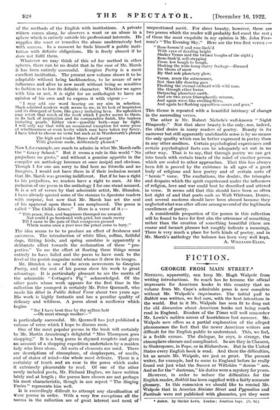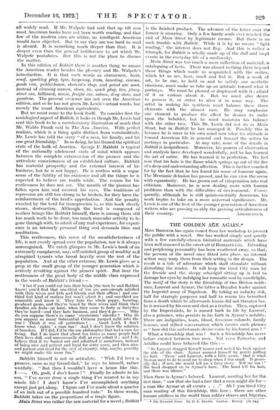FICTION.
GEORGIE FROM MAIN STREET.* • Babbitt, Dy Sinclair Lewis, London ; Jonatban Cape. [is. 6d.1 NOTHING, apparently, can keep Mr. Hugh Walpole from writing introductions. So much has he become the official impresario for American books in this country that no volume from Mr. Cape's admirable press is now complete without Mr. Walpole's imprimatur. The initial puff to Babbitt was written, we feel sure, with the best intentions in the world. But in it Mr. Walpole has seen fit to drag nut the old discussion about American books not being much read in England. Readers of the Times will well remember Mr. Lewis's sudden access of boorishness last summer. Mr. Walpole now offers as a partial explanation of the alleged phenomenon the fact that the newer American writers are difficult for the English public to understand. This, we feel, is a feeble excuse. The dialogue, he says, is strange, the atmosphere obscure and complicated. So are they in Chaucer, in Shakespeare, in Pope, or in Richardson. But in the United States every English book is read. And there the difficulties, let us assure Mr. Walpole, axe just as great. The present writer, for example, had to come to England before he really found out just what the Sussex or Wiltshire " downs " are. And as for the' dustman," his duties were a mystery for years.
However, in order to reduce the difficulties for the English reader, Babbitt has been supplied with a fairly accurate glossary. In this connexion we should like to remind Mr. Walpole that in America Sinister Street and Pygmalion and Fortitude were not published with glossaries, yet they were
all widely read. If Mr. Walpole had said that up till now most American books have not been worth reading, and that few of the modern ones arc either, no intelligent American would have objected. But to say they are too hard to read is absurd. It is something much deeper than that. It is deeper even than the general indifference to art which Mr. Walpole postulates. But this is not the place to discuss the matter.
In this edition of Babbitt there is another thing to amuse the American reader besides the glossary and Mr. Walpole's introduction. It is that such words as charwomen, boots, scarf, sparking plug, tyre, twopenny, tram, hoarding, cinema, goods ran, public-house, chemist's shop, and petrol are used, instead of cleaning women, shoes, tie, spark plug, tire, jitney, street car, billboard, movie, freight car, saloon, drug store, and gasolene. The present reviewer has not seen the American
edition, and so he has not given Mr. Lewis's actual words, but merely the usual American equivalents.
But we must come to the book itself. To consider first the sociological aspect of Babbitt, it looks as though Mr. Lewis had sent this book to be a corroboratory illustration of much that Mr. Waldo Frank said in The New America. With perfect
realism, which is a thing quite distinct from. verisimilitude, Mr. Lewis has told the story "of a man, his family, and his one great friendship." In so doing, he has lamed the spiritual state of the bulk of America. George F. Babbitt is typical of the nationally adolescent state of mind which appears between the complete extraversion of the pioneer and the articulate conscionsness of an established culture. Babbitt has material prosperity and the external interest of his business, but he is not happy. He is restless with a vague sense of the futility of his existence and all the things he is expected to believe arc worth while. The reason for his restlessness he does not see. The mantle of the pioneer has fallen upon him and covered his eyes. The traditions of repression arc still too strong to be broken,. for they have the reinforcement of the herd's approbation. And the penalty exacted by the herd for transgression is, as this book clearly shows, destruction. Although the herd is composed of restless beings like Babbitt himself, there is among them still too much work to be done, too much muscular activity to be gone through with, to admit of any real experience, for experi- ence is an intensely personal thing and demands time and meditation.
This restlessness, this sense of the unsatisfactoriness ef life, is not evenly spread over the population, nor is it always unrecognized. We catch glimpses in Mr. Lewis's book of an extremely complacent, nay, self-satisfied group of wealthy ar d atrophied tyrants who brood heavily over the rest of the population. And at the other extreme, Mr. Lewis gives us a peep at the small group of the younger generation which is actively revolting against the pioneer spirit. But hear the restlessness of the great body of the middle class expressed in the words of Babbitt's friend :—
" I bet if you could cut into their heads [the men he and Babbitt Imowl you'd find that one-third of 'em are sure-enough satisfied with their wives and kids and friends and their offices ; and one- third feel kind of restless but won't admit it ; and one-third are miserable and know it. They hate the whole peppy, boosting, go-ahead game, and they're bored by their wives and think their families are fools—at least, when they come to forty or forty-five they're bored—and they hate business, and, they'd go—. Why do you suppose there's so many ` mysterious ' suicides ? Why do you suppose so many Substantial Citizens lumped right into the war ? Think it was all patriotism . . . Good Lord, I don't know what ' rights ' a man has ! And I don't know the solution of boredom. If! did, I'd be the one philosopher that had a cure for living. But I do know that about ten times as many people find their lives dull, and unnecessarily dull, as ever admit it ; and / do believe that if we busted out and admitted it sometimes, instead of being nice and patient and loyal for-sixty years, and then nice and patient and dead for the rest of eternity, why, maybe, possibly we might make life more fun."
Babbitt himself is not so articulate. "Wish I'd been a pioneer, same as my Grand-dad," he says to himself, rather
wistfully. "But then I wouldn't have a house like this. I—. Oh, gosh, I don't know I " Finally he admits to his son, "I've never done a single thing I've wanted to in my whole life ! I don't know's I've accomplished anything
except just get along. I figure out I've made about a quarter of an inch out of a possible hundred rods." In those words, Babbitt takes on the proportions of a tragic figure.
Main Street was rather the raw material for a novel ; Babbitt
is the finished product. the advance of the latter over the former is amazing. Only a few hardy souls ever reached the
end of Main Street by legitimate means. But there is no such trouble with Babbitt. While it is by no means •• light reading," the interest does not flag. And this is rather a triumph, for Babbitt is wholly made up of the dull and inept events in the everyday life of a mediocrity. Main Street was too much a mere collection of material, a cataloguing of facts. There was almost nothing there beyond those things which made us acquainted with the milieu, which let us see, hear, smell and feel it. But a work of art, to be one, to hold us and to satisfy our aesthetic emotions, must make us take up an attitude toward what it portrays. We must be pleased or displeased with it ; afraid of it or curious about it. But we must also desire to possess it, or strive to alter it in some way. The artist in making his synthesis must balance these three elements with the utmost care. Ile may emphasize one element to produce the effect he desires • to make upon the beholder, but he must maintain his balance with the other two. This Mr. Lewis did not do in Main Street, but in Babbitt he has managed it. Possibly this is because he is surer in his own mind now what his attitude is toward American life in general and toward the milieu he portrays in particular. At any rate, none of the details in Babbitt is insignificant. Moreover, his powers of observation and analysis have developed wonderfully, and he has learned the art of satire. He has learned it to perfection. We feel now that his hate is the flame which springs up out of the fire of a deep and understanding affection. This is further vouched for by the fact that he has found his sense of humour again. The Messianic delusion has passed, and he can view the scene with equanimity. He has grown out of vituperation into real criticism. Moreover, he is now dealing more with human problems than with the difficulties of environment. Conse- quently, although he is still quintessentially American, his work begins to take on a more universal significance. Mr. Lewis is one of the best of the younger generation of American writers who are proving so ably the growing articulateness of















































 Previous page
Previous page